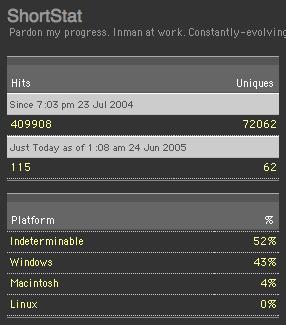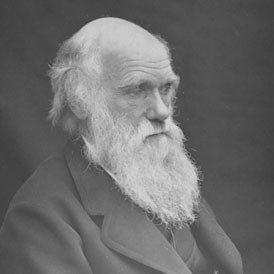And, ladies and gentlemen, so are we. Not that we've been slacking. No way, José. We've been out spreading truth near and far throughout the blogosphere, one click at a time. We were just cruisin' along, and -- lo! -- an all points bulletin comes crackling in through our radio from deep within the Delta Quadrant:
archaeolog.com is back in action! Could it be true? We had our doubts... But then we noticed that all three links in
Dr Shanks's most recent post (and three of the four in
the one before that) went -- in true Archaeolog fashion -- to pages somewhere within his
own MetaMedia MegaSite. Nope! No fakes or counterfeits here -- this is the real deal. Well, we welcome you back, Dr Shanks. We hope you've managed to dig yourself out of that mountain of comment spam, and we look forward to reading the posts to come.
But since we just touched on the topic of numbers... Congratulations on your blogospheric success.
Archaeolog receives 60k hits and about 15 thousand visitors a month.
That's fantastic. Or perhaps we should say
fantastical. Because -- well, we admit it -- we snooped around a little and took a look at your site stats. And,
mirabile visu,
your hit counter started ticking eleven months ago, almost to the exact day! And -- since our maths skills are crap -- that made it a bit easier for us to do the calculations. And here's what we saw earlier this morning, as you can see from the timestamp in the image:
So let's see here: 409,908 ÷ 11 = 37,264. Hey, wait a second -- that's only 63% of the monthly '60k hits' you counted. And those '15 thousand [presumably unique] visitors'? Hmm. 72,062 ÷ 11 = 6,551. That's less than half of your count. In fact, at 44%, that's more than 10% less than half... We think. Our brains are beginning to get boggled.
And who exactly is reading, besides us and
Alun? Let's take a look!
Looks like... A lot of people surfing for pictures. God only knows what of. And if you were to scroll down that list a little further:
Poker anyone -- maybe soome Texas Hold 'Em? There's highprofitclub.com and nutzu.com. Or maybe you'd like to take a new mortgage out at doobu.com. Could it be that somehow all that comment spam was helping MetaMedia rack up some of its thousands of hits? We haven't a clue. We're not all that good with these computers and stuff.
Anyway, we look forward to the forthcoming rants and ruminations. And we're particularly curious to see how the plan to collectivize Archaeolog works out -- as we said many months back (just scroll two posts down), archaeology and classics have been pretty lousy at exploiting the Web's dialogic potential. But wait -- wasn't the MetaMedia wiki supposed to be a collective? Oh, never mind. What an utter pain in the arse those wiki things are to use anyway. We always thought the perfect thing for Shanks & Co. would be
Scoop -- heck, it even bills itself as 'Collaborative Media for the Masses'. It's a completely different beast from simple group blogs (like ours), and it's been used with great success at places like
TPM Cafe and
The Daily Kos -- anyone can just sign up for a diary or blog within the site and throw in their deep, deep thoughts. For all MetaMedia's bells and whistles, so far it's been way behind the curve in the bigger universe of collaborative projects. But maybe were entering into a brave new world.








